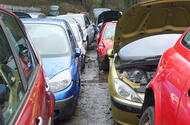The Dangers of Reselling Written-Off Cars

The Thriving Salvage Repair Business
Salvage repairers are thriving in the used car market, but questions arise about the safety of their practices and whether rules are being broken. Many salvage repairers post videos on YouTube, showcasing their work and attracting customers with catchy slogans like “From trash to cash!” and “Soo cheap!”. These videos often feature enthusiastic individuals with a knack for social media, accompanied by experienced workers who actually perform the repairs. However, the profitability of this business raises concerns about the quality and safety of the repaired vehicles.
A Tragic Incident Highlights the Risks
A tragic incident involving a six-year-old girl named Sadie McGrady serves as a stark reminder of the dangers associated with reselling written-off cars. Sadie was killed in a car crash, and it was later revealed that the Vauxhall Corsa she was traveling in had been previously written off by insurers after an accident in 2008. The car was sold to a salvage company, repaired, and put back on the road. The vehicle examiner who testified at the inquest stated that the repair had weakened the car’s structure, making it more susceptible to intrusion and increasing the likelihood of injury. The coroner emphasized the need for stricter regulations to prevent such incidents from occurring.
The Problem with Salvage Codes
While efforts have been made to improve the salvage codes used to identify the status of write-offs, there are still significant gaps in the regulations. Category S (structurally damaged but repairable) and Category N (non-structurally damaged and repairable) write-offs can be repaired and returned to the road without undergoing inspections. Category A vehicles must be scrapped, while Category B cars can be dismantled for spare parts. However, special vehicles and self-insured cars are exempt from these codes, creating further loopholes.
Potential Misapplication of Salvage Codes
Concerns have been raised about the misapplication of Category S and N codes, which may result in improperly classified vehicles being sold. Tim Kelly, a former director of the Institute of Automotive Engineer Assessors, believes that some salvage sellers may be responsible for assessing the write-off categories of the vehicles they market. This conflict of interest could lead to cars being wrongly coded, with Category S vehicles being labeled as Category N to increase their selling price. The Association of British Insurers (ABI) advises individuals who are unhappy with the assessment of a vehicle to contact the insurer for further investigation.
The Need for Inspections
Although inspections of repaired write-offs are not legally required, there are companies like Autolign that offer inspection services. Autolign, the only company recognized by HPI for this purpose, checks the quality of repaired vehicles before removing the Cat S or N code and moving the vehicle to its Condition Inspected register. However, Autolign does not inspect Category A or Category B vehicles. The lack of scrutiny in the repaired salvage market raises concerns about the quality of repairs and the safety of these vehicles.
The Business of Repairing Written-Off Cars
The repair of Category S and N write-offs is a lucrative business, with leading salvage supplier Copart claiming to sell nearly a quarter of a million of these vehicles annually. While some vehicles are dismantled for spare parts, many are repaired and resold to the public. Online marketplaces advertise thousands of repaired Cat S and N cars, along with outdated Cat C and D write-offs that can also be repaired and returned to the road. However, there are concerns about the qualifications and expertise of technicians involved in these repairs, especially when it comes to modern cars that require specific techniques and equipment.
The Importance of Due Diligence
Considering the potential risks associated with repaired write-offs, it is crucial for buyers to exercise caution and conduct thorough research before making a purchase. Tim Kelly advises potential buyers to inquire about the repairer’s qualifications, repair methodology, and equipment used. It is also important to request pictures of the car after the crash and throughout the repair process. By taking these precautions, buyers can avoid purchasing a vehicle that may pose serious safety hazards.
Ultimately, the allure of a bargain should not overshadow the importance of ensuring the safety of a vehicle. Reselling written-off cars without proper inspections and regulations can have devastating consequences, making it imperative for the industry to prioritize safety and transparency.

